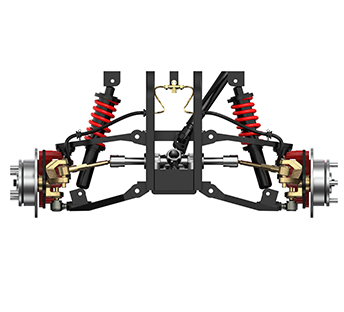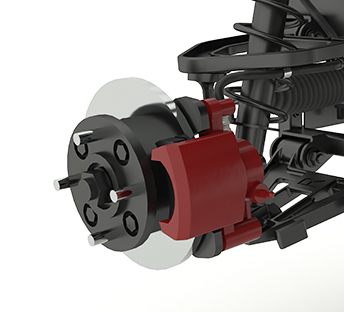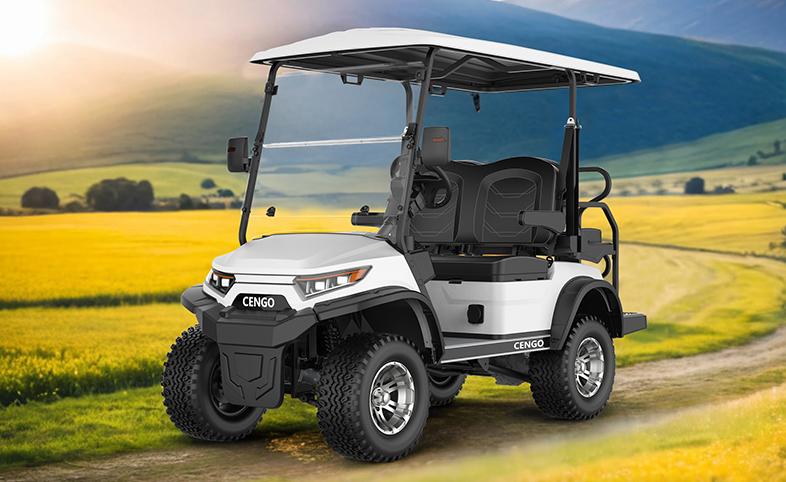The demand for electric golf carts continues to grow across resorts, campuses, industrial sites, and private properties. However, first-time buyers and procurement teams may find themselves overwhelmed by the cart’s technical specifications, many of which can be unfamiliar.
In this article, CENGO will provide you with a comprehensive electric golf cart buying guide, breaking down the most important specifications to help you make a more informed and confident decision.
Picture shown: 4-seater lifted golf cart (NL-LC2+2G)
Key Specifications and Electric Golf Cart Buying Tips
Here is a complete breakdown of the core golf cart specifications that every first-time buyer needs to understand:
1. Battery Type & Capacity
Battery type and capacity directly affect the cart’s range, charging time, and maintenance needs. You’ll typically choose between lead-acid and lithium-ion batteries, each with distinct advantages: lead-acid batteries are more affordable but heavier and require more maintenance, while lithium-ion batteries are lighter, longer-lasting, and maintenance-free but come at a higher cost.
Additionally, most electric golf carts operate on either 48V or 72V systems, among which the 72V electric golf cart offers more power for heavy loads or hilly terrain.
Another critical specification about the electric golf cart is the ampere-hour (Ah), which indicates the amount of energy the battery can store. A higher Ah rating may suggest that the cart can run longer between charges, but it should be compared within the same voltage and battery type for accuracy.
2. Motor Power (kW/HP)
Motor power affects how the cart accelerates, handles inclines, and performs under load. It is measured in kilowatts (kW) or horsepower (HP), with higher ratings generally indicating stronger performance. Generally, lower-power motors, typically around 3-5 kW, are suitable for flat terrain and light-duty use, while motors rated at 5 kW or more are better suited for hills or carrying additional weight.
3. Seating & Load Capacity
Golf carts are commonly available in two-, four-, or six-seat configurations, with some models offering foldable rear seats or integrated cargo platforms. However, the seating capacity does not reflect the total weight the cart can safely carry.
The rated load includes the combined weight of passengers, cargo, and the battery system. Exceeding this limit can reduce performance, shorten battery life, and cause unnecessary wear on mechanical components.
4. Chassis and Suspension
The chassis determines the structural strength of the cart, directly affecting its durability and resistance to corrosion. Steel frames are strong but require a protective coating in humid or coastal environments, whereas aluminum frames are lighter and naturally resistant to rust.
Meanwhile, suspension systems impact ride comfort and stability. Solid axles with leaf or coil springs are cost-effective and durable on flat terrain but offer less comfort on rough terrain. Independent suspensions offer better handling and smoother rides on uneven surfaces, although they come at a higher cost and increased complexity.

Picture shown: suspension system of electric golf cart
5. Additional Features (Brakes, Tires, Lighting, Accessories)
Additional components, such as brakes, tires, lighting, and accessories, significantly impact the usability and safety of golf carts.
· Drum brakes are common for light-duty use, while disc brakes offer better control on slopes or with heavier loads.

Picture shown: four-wheel disc brakes
· Turf tires are ideal for grass, while all-terrain tires are better for gravel or paved surfaces.
· While headlights are often included in most golf carts, brake lights, turn signals, and reflectors are required for driving on shared roads.
· Accessories like mirrors, USB ports, weather covers, and solar charging panels can enhance convenience depending on how and where the cart will be used.
This golf cart buying guide also highlights common pitfalls that buyers should be aware of during the selection process. Let’s have a look at them.
Common Traps and Misunderstandings about Electric Golf Carts
While the above golf cart buying tips can guide you in the right direction, it is equally essential to be aware of misleading claims and common misconceptions.
1. Peak vs. Continuous Power
One common misunderstanding is the distinction between peak motor power and continuous power. Peak power refers to short power bursts, while continuous power reflects sustained performance during regular use.
2. Relationship between Battery Voltage and Range
Another common misconception is assuming that higher battery voltage means a longer range. In fact, driving range depends on total energy capacity, which includes both battery voltage and ampere-hour ratings (voltage × amp-hours). Moreover, real-world range is influenced by various factors such as vehicle load, terrain, and driving habits.
Learn more about whether electric golf carts are worth your investment: Electric or Gas Golf Cart? Is It Worth Buying Electric Golf Carts?
CENGO: A Trusted Name in Electric Golf Carts
As illustrated at the beginning of this electric golf cart buying guide, it is clear to see that the demand for reliable electric golf carts continues to rise. CENGO stands out as a reliable manufacturer that delivers high-performance electric golf carts globally.
At the 137th Canton Fair, our booth drew a large number of international buyers, with visitors from over 30 countries and regions, including Saudi Arabia, the UAE, Europe, and Southeast Asia. On-site discussions led to multiple cooperation agreements, reinforcing our growing position in the global electric vehicle market.
With over 15 years of industry experience and clients in tourism, golf, and other sectors, we continue to focus on developing different types of golf carts. Backed by international certifications and a production capacity exceeding 60,000 units annually, we deliver dependable solutions for buyers seeking long-term performance and responsive service.
Wrapping Up
As explained in this golf cart buying guide, understanding key specifications is essential to selecting the right electric golf cart. A clear focus on battery type, motor power, load capacity, and real-world features helps avoid costly mistakes.
CENGO is a reliable and experienced golf cart manufacturer, backed by strong performance at the Canton Fair and interest from global buyers. With durable designs, intelligent systems, and professional support, we offer solutions built for long-term use.
If you are interested in our offerings and services, feel no hesitation to contact us here!
Post time: Jul-08-2025




